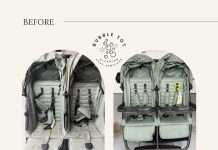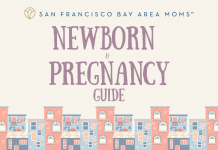 When I started writing articles about parenting, I made a personal vow never to write about breastfeeding because it felt overdone; there are already so many blog posts on the topic. Then, I realized exactly why it’s such a popular and, often, controversial subject: Feeding our babies is an immensely personal and individual experience, yet, we still hope to see our choice and rationale reflected and validated back to us.
When I started writing articles about parenting, I made a personal vow never to write about breastfeeding because it felt overdone; there are already so many blog posts on the topic. Then, I realized exactly why it’s such a popular and, often, controversial subject: Feeding our babies is an immensely personal and individual experience, yet, we still hope to see our choice and rationale reflected and validated back to us.
Especially for first time moms, feeling like you’re “doing it right” is really important, so we scour the internet for the answers we want to hear to motivate us to continue whatever we’re doing or to give us the courage to change it. I finally realized that my experience might be the thing that helps another mother feel good about how she’s chosen to feed her baby, so here I go. It’s time to add my story to the discussion.
I absolutely chose myself and my well being over my baby’s access to the “liquid gold” of breastmilk,
And I’ve never regretted it for a moment.
When I was pregnant, I assumed I would breastfeed, but I quickly discovered that I absolutely hated it. HATED IT. Yes, my daughter had latching issues, and I was in a lot of pain, but more than anything, I wanted my body back to myself. I didn’t want to admit this at first — I thought I shouldn’t, so I poured money into visits with a lactation consultant. I tried using a nipple shield. I put olive oil, lanolin and every other home remedy on my bleeding nipples, and I bought a top-of-the-line breast pump in the hopes that these things would get me over the hump and into the “it gets easier” phase that everyone told me would eventually come.
Instead, I grew to resent my poor little baby, my husband, and everyone else who encouraged me to keep going. I couldn’t figure out how to express my frustrations in a way that would make people understand and support me, instead of telling me to try harder. I hated the little things connected to breastfeeding like having to calculate when I could safely drink a glass of wine, wondering if what I was eating was responsible for giving my baby gas, and having to choose my outfits based on how easily I could whip out my painfully engorged boobs. More than anything, I felt trapped by the demands of being my child’s only food source, and I absolutely dreaded feeding her — as in, my husband would hand her to me when she was hungry, and I would hunch my shoulders and silently cry as I struggled to get her to latch.
Looking back, I definitely had a case of the baby blues, which exacerbated my already intense feelings, and, who knows, maybe if I had stuck with it, I would have gotten to the other side, but I doubt it, and it wasn’t worth the risk.
By four weeks, my daughter was exclusively on formula, and I did a little happy dance every time I shook up her bottle. The decision to stop breastfeeding was life changing for all of us. My resentment toward my baby instantly and completely disappeared once the burden of breastfeeding her was gone.
With my second baby, my son, I decided to try again. Even though I was relieved to stop nursing my daughter, I didn’t feel like I had closure on the issue. It remained a sensitive topic for me because I felt like I had failed (and I don’t like to fail). I gave it another whirl with my son — this time with higher levels of patience and lower expectations for myself.
Do you know what? It was easier this time. I was in a better place mentally, I wasn’t in pain, I found it more convenient than preparing bottles, and I even enjoyed it — all for about six weeks. Then, I wanted my body back to myself again. No dramatic tears or angst this time. I was confident and at peace with my decision.
Sometimes, against my better judgment, I’ll read the Facebook comments on breastfeeding articles and marvel at how much interest people take in the reasons why a baby is fed either breastmilk or formula, as if the motivation for either choice has an effect on the end result. They’ll say something like, “I can understand feeding formula, if you have no other choice, like if the baby’s adopted, but if you can do it, it’s totally selfish to give formula.”
Well, I’m declaring here and now that selfishness is as valid a reason to stop nursing as any other. Martyrdom and motherhood are not the same thing.
To be a good mother, I have to be mentally and physically able to care for my baby, and breastfeeding prevented me from doing that. I was not the mother my daughter deserved, and I was careful not to become that way with my son. Since then, I have had almost daily opportunities to make sacrifices big and small for my children, and you will, too. Breastfeeding doesn’t necessarily have to be one of them.
As for their well being, they were both healthy babies and continue to be healthy kids who rarely get sick, despite missing out on regular doses of immune-boosting breastmilk that I hear so much about. Four years later, they’re each smart, strong, kind, and witty. You’d never be able to guess whether they were breastfed or for how long.
That’s because what we feed our babies is a very tiny piece of the puzzle for raising children. I know it’s all consuming when you’re in the thick of it, but, in the long run, your child is not likely to thank you for making it to the six month mark instead of the six week mark. Breastfeed if you want to, not only because you think you should, but, either way, I will fully support your right to nurse or pump at home, at work, and in public.
But, if you’re looking for a way out, like I was, I’m telling you right now that you can stop, and it will be okay. We’re lucky enough to live in a time and place where the option of formula is perfectly safe and nutritious for our babies. You will still be a good mother if you feed your baby formula. In fact, you might become a better one.

















